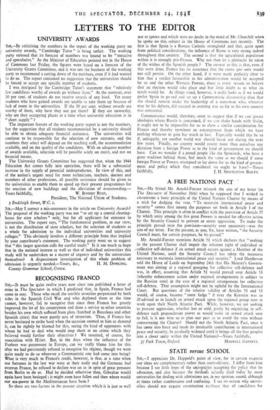A FREE NATIONS PACT -
Snt,—My friend Mr. Arnold-Forster mistook the aim of my letter (in The Spectator of November 26th) when he supposed that I wished to circumvent a basic principle of the United Nations Charter by means of a trick for dodging the veto. " To maintain international peace and security " comes first among the purposes set forth in Article 1 of the Charter. This principle is often in conflict with the provision of Article 27 by which unity among the five great Powers is needed for effective action by the Security Council to prevent or arrest aggression. To make the principle prevail over the provision—security over unanimity—was the aim of my letter. For the present, as you, Sir, have written, " the Security Council must, for certain purposes, be by-passed."
Mr. Arnold-Forster mentions Article 51 which declares that " nothing in the present Charter shall impair the inherent right of individual or . collective self-defence if an armed attack occurs against a Member of the United Nations, until the Security Council has taken the measures necessary to maintain international peace and security." Lord Henderson told the House of Lords on September 24th that His Majesty's Govern- ment was aiming at a regional grouping for collective self-defence and was, in effect, assuming that Article 51 would prevail over Article 53 (whereby enforcement action under regional arrangements is subject to the Russian veto) in the case of a regional arrangement for collective self-defence. That assumption might not be upheld by the International Court. But questions of the relative validity of Articles 51 and 53 would, of course, become " mere fudge " if ever the Kremlin was so ill-advised as to launch an armed attack upon the regional group now at work upon their North Atlantic Pact. While, however, we are seeking to prevent aggression, whether hot or cold, partly by organising in self- defence such preponderant power as would make an armed attack sure to fail, is it not wise so to plan our pact as to avoid the veto without contravening the Charter? Should not the North Atlantic Pact, once it has came into force and made its invaluable contribution to international peace and security, be gradually widened until it brings all the free peoples into a closer unity within the United Nations?—Yours faithfully,


































 Previous page
Previous page